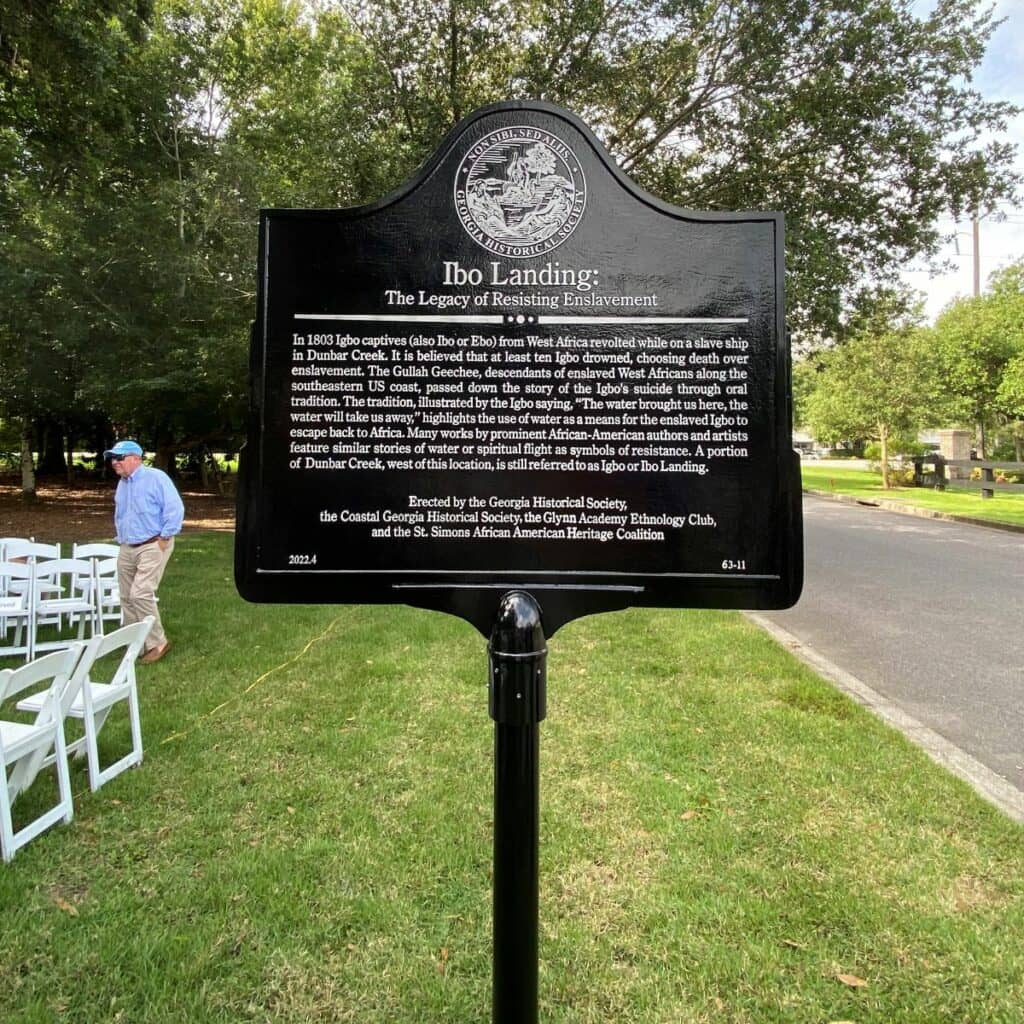Igbo Landing is a historic site at Dunbar Creek on St. Simons Island, Glynn County, Georgia. In 1803 one of the largest mass suicides of enslaved people took place when Igbo captives from what is now Nigeria were taken to the Georgia coast. In May 1803, the Igbo and other West African captives arrived in Savannah, Georgia, on the slave ship the Wanderer. They were purchased for an average of $100 each by slave merchants John Couper and Thomas Spalding to be resold to plantations on nearby St. Simons Island. The chained slaves were packed under deck of a coastal vessel, the York, which would take them to St. Simons. During the voyage, approximately 75 Igbo slaves rose in rebellion, took control of the ship, drowned their captors, and in the process caused the grounding of the ship in Dunbar Creek.
The sequence of events that occurred next remains unclear. It is known only that the Igbo marched ashore, singing, led by their high chief. Then at his direction, they walked into the marshy waters of Dunbar Creek, committing mass suicide. Roswell King, a white overseer on the nearby Pierce Butler plantation, wrote the first account of the incident. He and another man identified only as Captain Patterson recovered many of the drowned bodies. Apparently only a subset of the 75 Igbo rebels drowned. Thirteen bodies were recovered, but others remained missing, and some may have survived the suicide episode, making the actual numbers of deaths uncertain.
Regardless of the numbers, the deaths signaled a powerful story of resistance as these captives overwhelmed their captors in a strange land, and many took their own lives rather than remain enslaved in the New World. The Igbo Landing gradually took on enormous symbolic importance in local African American folklore. The mutiny and subsequent suicide by the Igbo people was called by many locals the first freedom march in the history of the United States. Local people claimed that the Landing and surrounding marshes in Dunbar Creek where the Igbo people committed suicide in 1803 were haunted by the souls of the dead Igbo slaves. The story of Igbo, who chose death over slavery which had long been part of Gullah folklore, was finally recorded from various oral sources in the 1930s by members of the Federal Writers Project.
While many historians for centuries have cast doubt on the Igbo Landing mass suicide, suggesting that the entire incident was more legend than fact, the accounts Roswell King and others provided at the time were verified by post-1980 research which used modern scientific techniques to reconstruct the episode and confirm the factual basis of the longstanding oral accounts.
In September 2002, the St. Simons African American community organized a two-day commemoration with events related to Igbo history and a procession to the site of the mass suicide. Seventy-five attendees came from different states across the United States, as well Nigeria, Brazil, and Haiti. The attendees designated the site as a holy ground and called for the souls to be permanently at rest. The Igbo Landing is now part of the curriculum for coastal Georgia schools.
Subjects:
African American History, Events
Terms:
United States – Georgia, 19th Century (1800-1899), Africa – Nigeria, Racial Conflict – Resistance/Rebellion, South America-Brazil, North America-Haiti
SOURCE OF THE AUTHOR’S INFORMATION:
“Igbo Landing,” New Georgia Encyclopedia, https://www.georgiaencyclopedia.org/articles/history-archaeology/ebos-landing; “Igbo Landing,” Glynn County, Georgia History and Lore, http://www.glynncounty.com/History_and_Lore/Ebo_Landing/; Marquetta L. Goodwine, The Legacy of Ibo Landing: Gullah Roots of African American Culture (Atlanta: Clarity Press, Inc., 1998).



